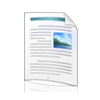Des bibliothèques pour une culture vivante
- Auteur : Roman, Joël
- Résumé en allemand : Die Bestandserhaltung wurde lange Zeit als Hauptaufgabe der Bibliotheken angesehen. Heute noch muss die Bibliothek als kulturelles Gedächtnis unserer Gesellschaft fungieren. Doch was tun mit diesen Erinnerungsstücken ? Abgesehen vom Thema Informationsträger (sowohl Papier als auch andere) wirft sich die Frage auf ob die neuen Kommunikations- und Informationstechnologien nicht unsere Denkgewohnheiten ändern, zumindest auf zweifache Weise. Einerseits durch die ungemein grosse Speicherungskapazität, die uns zwingt immer wieder neue Filter zu suchen um eine Form von Seltenheitswert wiederherzustellen. Und andrerseits durch die Bevorzugung kurzweiliger «Aktualität » vor dauernden Erinnerungen. Wie kann man zwischen Bildung und Zerstreuung die Möglichkeit einer lebendigen Kultur bewahren ?
- Résumé en anglais : For a long time preservation was considered the main function of libraries. Today's library still must act as cultural memory for our society. But what shall we do with this memory? Leaving aside the question of the physical medium (paper or otherwise) we must ask ourselves whether the new information and communication techniques do not alter our mental patterns, at least in two ways. First, in providing a considerable increase in storage capacity which requires constantly to look for new filters so as to recreate a form of rareness. Secondly, in giving greater impoortance to short-lived «current events» over a lasting memory. What are the chances of retaining a living culture between erudition and dispersion ?
- Résumé : Longtemps, la fonction des bibliothèques a été perçue comme avant tout patrimoniale. Aujourd'hui encore, la bibliothèque se doit d'être la mémoire culturelle dont notre société a besoin. Mais que faire de cette mémoire ? Indépendamment de la question des supports, les nouvelles technologies ne transforment-elles pas nos habitudes mentales en accroissant considérablement la possibilité d'archivage ce qui contraint à rechercher de nouveaux filtres, à recréer une forme de rareté, et en privilégiant le temps court de « l'actualité » sur le temps long de la mémoire ? Entre l'érudition et la dispersion, comment préserver les chances d'une culture vivante ?
- Paru dans le numéro : n°2 : Les politiques documentaires
- Licence de diffusion : Tous droits réservés
- Format : Fichier XML
- Étendue : 18523
- Date de publication : 1999
- Langue : fr
- Sujet(s) : bibliothécaire , évolution , fonction
- Type de ressource : Text
Ce document est également disponible dans le format suivant :

